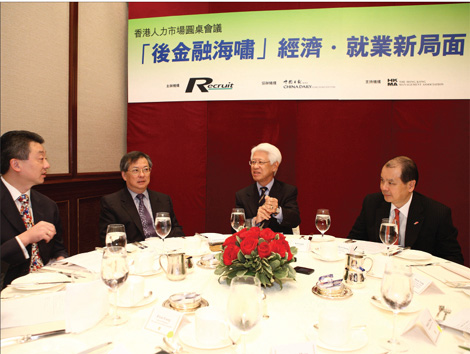Economic recovery is on course
Updated: 2009-12-18 07:29
By Joseph Li(HK Edition)
|
|||||||||
|
Experts share their views on the post-tsunami economic and employment pictures at the Roundtable meeting. |
At the Roundtable luncheon meeting co-hosted by Recruit and China Daily Hong Kong Edition last week, representatives from the government, business and academic sectors were invited to share their insights and thoughts in the economic and employment scenarios of the post-tsunami era.
Veteran human resources consultant K.S. Yeung, who was the moderator at the luncheon meeting, said the shocks of the financial tsunami are gradually dissipating. He believes the tourism, retail and catering sectors are doing well because there are many tourists, especially mainland tourists, coming to Hong Kong.
Yet he noted that over the past year, a great many jobs in the financial and related industries were lost owing to the adverse financial situation. Given that employers have become far more cautious and demanding in filling vacancies after the financial tsunami, he advised job seekers to equip themselves fully in their new job endeavors.
In particular, he expressed concern about the perseverance of young people today. In his opinion, young people in the 1970s were more hard-working and accustomed to hard work. On the other hand, contemporary young people, who are living in more comfortable conditions, do not have the kind of fighting spirit of their parents and forerunners.
Tommy Cheung, the lawmaker who represents the catering constituency, is, however, less than optimistic about an economic recovery in the near future from now, fearing that the second round of the financial tsunami could burst out yet again.
"I worry that another round of credit crunch may occur in the US," he said. "If that happens, the economic recession will cause far deeper woes." For this very reason, he always reminds restaurant owners to be less aggressive and be very careful with their cash flow.
In likening the situation of the catering sector in the current financial crisis to the 1997 financial turmoil and 2003 outbreak of the SARS virus, he said rents and wages were both dropping in those economic bad times.
However, rent has not only increased, but also wages have not decreased, this time. The price of imported food items is also on the high side at a time of a weak US dollar. "The situation of the catering sector appears to be good," he said. "but the business turnover in November this year was not as good as at the same time last year. We hope for better business turnover at Christmas and we dare not raise our prices."
Damien Lee, Director of Human Resources Services of Hong Kong Disneyland, said the influx of mainland visitors in recent years has helped Hong Kong tourism a great deal.
The global financial meltdown, which affected Western countries much more than the mainland and Hong Kong, had less of an impact on visits of mainland tourists to Disneyland than H1N1 did. In fact, the outbreak of the H1N1 swine flu caused mainland visitor throughput to fall because mainlanders feared that they would be quarantined and separated when they arrived in Hong Kong and upon their return home.
Yet since many mainland people have already visited Hong Kong, he reckons that the city and Disneyland must be able to offer new tourist attractions and fresh feelings to keep the tourists coming back.
Secretary for Labour and Welfare Matthew Cheung responded that the Hong Kong economy is beginning to recover, but cautioned that it is not a full-scale recovery. He was pleased that the manpower market has shown resilience, as the latest unemployment rate remained at 5.2 percent, climbing a mere 1.6 percent since the outbreak of the financial crisis.
Nonetheless, the labor minister admitted there are certain hidden problems of the local employment market."The structural unemployment problem is always there," he pointed out. "It is what we call the 'one middle and two low' problem that involves the middle-aged people with low education and skills. The mid-age unemployment problem, aggravated by the large number of people, most of whom are middle age people, coming from the mainland everyday, is a big problem.
"Youth unemployment is another big problem. The reason is there are fewer low-end jobs available for less-educated people as a result of computerization and modernization."
For the benefit of young people, the scope of the Employees Retraining Board mandate has been broadened to include youngsters from 15 years old, with up to sub-degree qualification.
Last year, the government initiated a range of measures involving more than HK$80 billion to save the financial system, support enterprises and preserve jobs after the onset of the financial meltdown.
The loan guarantee scheme for small and medium enterprises has managed to help more than 16,000 companies and save 260,000 jobs. "If the government had not done that, unemployment could reach double digit and be as bad as in the US," he commented.
On job creation, Cheung is upbeat that several impending major infrastructural projects will help ease unemployment in the construction sector. Lately, unemployment in the construction sector has decreased from the high point of 12.7 percent to 7.8 percent, he said.
Pending funding approval from the Legislative Council Finance Committee, works of the regional express rail link will commence in due course, while the tunnel works of the West Kowloon Cultural District project and the Disneyland expansion project will soon be under way.
In addition, construction of the Hong Kong-Zhuhai-Macao Bridge will begin this week, while site formation works of the Kai Tak cruise terminal will also start in the middle of the month.
The above mentioned projects will create jobs for both construction workers and the professional people, he said.
As to the decoration and maintenance workers, the Housing Society and the Urban Renewal Authority have launched the Operation Building Bright to provide maintenance services to about 2,000 aged buildings in the urban areas. Since August this year, over 4,000 jobs have been created.
While on the subject of tourism, Cheung noted with enthusiasm that from this week, mainland people living in Shenzhen, though they are non-Shenzhen residents, can apply to visit Hong Kong as individual travellers.
It is estimated that about 500,000 mainland people fall into this category, he said, and they can bring along huge economic benefits of up to HK$3 billion to the city when they live, dine and shop in Hong Kong.
Adolf Ho, Head of MBA Career Services & Corporate Services of the School of Business and Management of The Hong Kong University of Science and Technology, said the number of applicants for MBA programs increased significantly in times of economic reversal. More surprisingly, 90 per cent of the recent applicants have been foreign students from Europe, the US and from as far away as Mexico.
"A large number of foreign students applied because the economies in their own countries were not doing well. Again, they can find jobs in Hong Kong after graduation, but that means far stiffer competition for local candidates."
Derek Yung, Chief Executive of Prudential Assurance Co. Ltd., said the financial and insurance sectors were the hardest hit by the financial tsunami. Many jobs were cut and a further 10-20 percent reduction in jobs could be possible.
The outbreak of the financial crisis has made upper-echelon staff more cautious and reluctant to change jobs in this economic climate, he observed. The industry still needs quality people. Instead of offering high salaries, it will offer bigger performance-related variable bonuses.
"Most of the working class do not want to change jobs at this time and you can't expect big wage increases when you change jobs now," he said. Mathew Cheung and Tommy Cheung shared the same views, saying that young people today lack that kind of upward mobility to move up from a lower point.
They advised young people to equip themselves and not to be afraid to accept lower jobs with lower pay as a starting point. If they accumulate useful good experience, they can move up when opportunity knocks.
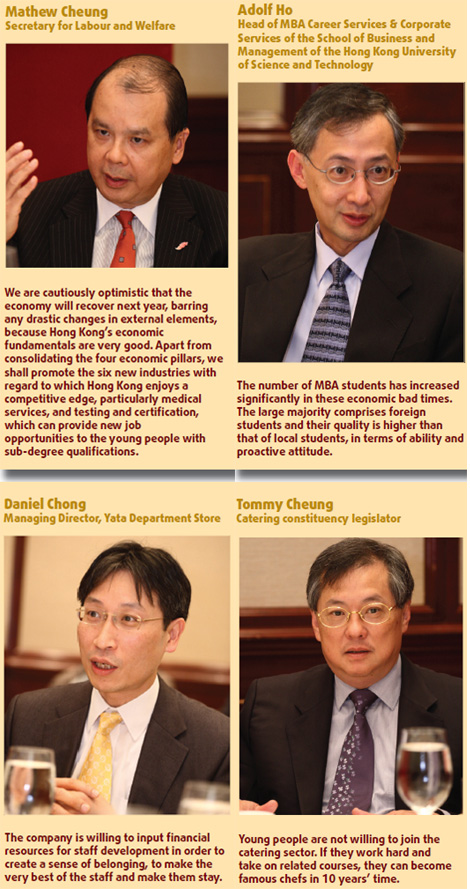
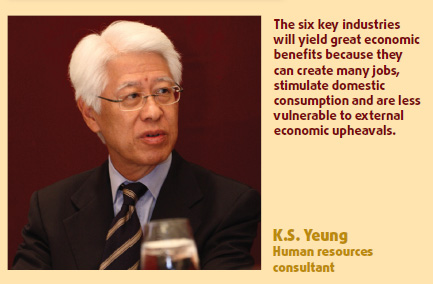
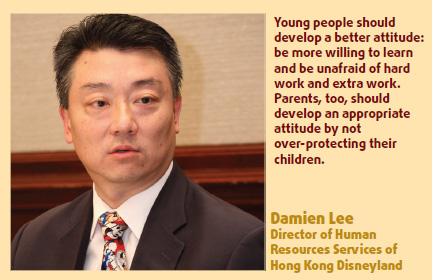
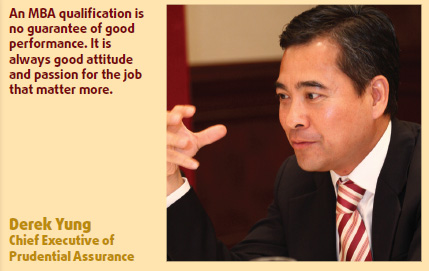
(HK Edition 12/18/2009 page4)
